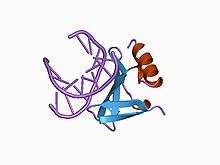Affitin
Affitins[1][2] (commercial name Nanofitins) are artificial proteins with the ability to selectively bind antigens. They are structurally derived from the DNA binding protein Sac7d, found in Sulfolobus acidocaldarius, a microorganism belonging to the archaeal domain. By randomizing the amino acids on the binding surface of Sac7d and subjecting the resulting protein library to rounds of ribosome display, the affinity can be directed towards various targets, such as peptides, proteins, viruses, and bacteria.[3][4] Affitins are antibody mimetics and are being developed as an alternative to antibodies as tools in biotechnology. They have also been used as specific inhibitors for various enzymes.
Properties
Affitins consist of 66 amino acids and have a molecular mass of about 7 kDa, small compared to antibodies with some 130–150 kDa. Being obtained from a thermophile organism, they are unusually heat resistant proteins. Unlike antibodies, affitins are produced in vitro, and therefore can be generated more quickly.[3] Due to their small size and high solubility, they can be easily produced in large amounts using bacterial expression systems.
References
- ↑ Correa, A; Pacheco, S; Mechaly, A. E.; Obal, G; Béhar, G; Mouratou, B; Oppezzo, P; Alzari, P. M.; Pecorari, F (2014). "Potent and specific inhibition of glycosidases by small artificial binding proteins (affitins)". PLoS ONE. 9 (5): e97438. doi:10.1371/journal.pone.0097438. PMC 4019568
 . PMID 24823716.
. PMID 24823716. - ↑ Pacheco, S; Béhar, G; Maillasson, M; Mouratou, B; Pecorari, F (2014). "Affinity transfer to the archaeal extremophilic Sac7d protein by insertion of a CDR". Protein Engineering Design and Selection. 27 (10): 431–8. doi:10.1093/protein/gzu042. PMID 25301962.
- 1 2 Mouratou, B; Schaeffer, F; Guilvout, I; Tello-Manigne, D; Pugsley, AP; Alzari, PM; Pecorari, F (2007). "Remodeling a DNA-binding protein as a specific in vivo inhibitor of bacterial secretin PulD". Proceedings of the National Academy of Sciences of the United States of America. 104 (46): 17983–8. doi:10.1073/pnas.0702963104. PMC 2084283
 . PMID 17984049.
. PMID 17984049. - ↑ Krehenbrink, M; Chami, M; Guilvout, I; Alzari, PM; Pécorari, F; Pugsley, AP (2008). "Artificial binding proteins (Affitins) as probes for conformational changes in secretin PulD". Journal of Molecular Biology. 383 (5): 1058–68. doi:10.1016/j.jmb.2008.09.016. PMID 18822295.

